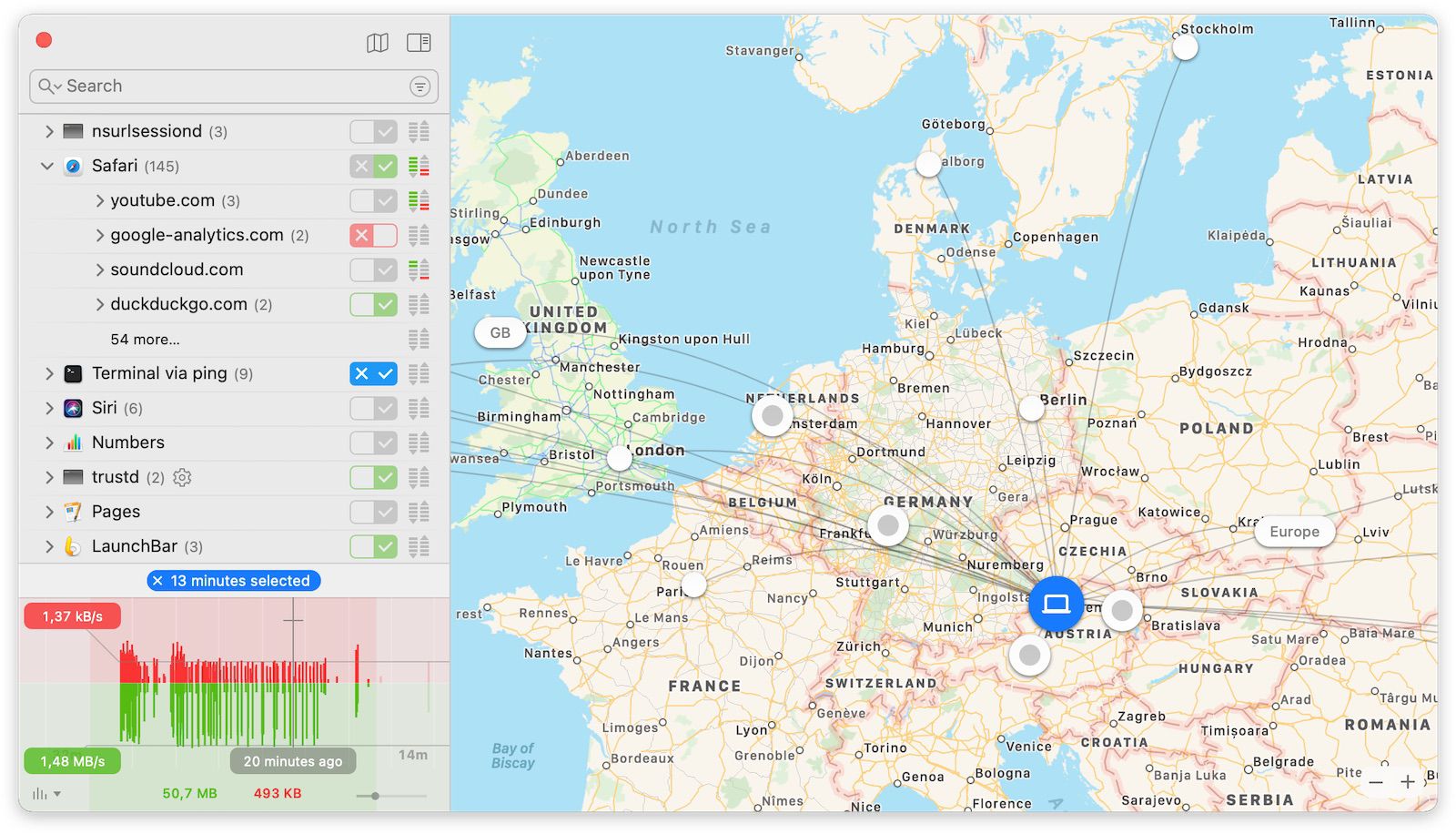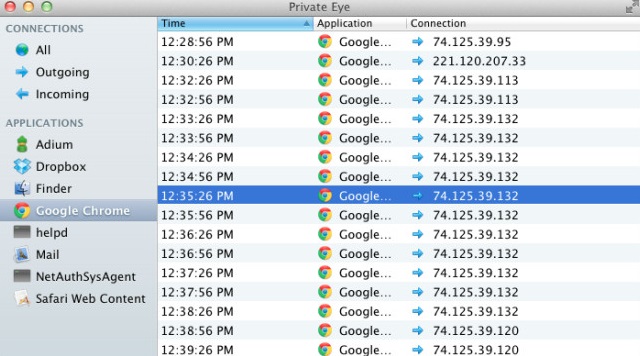Is an application to monitor and control the access of applications to your network and disks. Being able to monitor the normally unnoticeable activities enables you to make informed decisions regarding the transfer of your private information, hence avoiding confidential information leakage. If you have a problem with that (you do you), use a host based firewall (like Little Snitch) and just block that traffic (if you care about privacy and security and aren’t running a host based firewall you’re already wrong). As Apple has a soft fail for this, you can run apps without OCSP checks, contrary to the authors implication. Hands off is one of the most trusted applications and alternative to Little Snitch when it comes to network privacy. It is also an all-rounder application that gives protection both as the network firewall and application-specific firewall. It controls both inbound and outbound traffic of an application.
If you’re an iOS developer, this will make you very happy: Little Snitch 3.5 greatly improves support for iOS Simulator apps in every regard.
First and foremost, apps and processes that run in iOS Simulator are now easily recognizable by their name. For example, the iOS version of Safari is shown as “Safari (iOS)”:
Paths to iOS Simulator apps are clearly marked with a prefix. For stock apps like Safari, Maps or an iOS system daemon, Little Snitch will show “iOS Simulator” followed by the full path to the app’s or process’ binary. That path will be somewhere deep inside the Xcode app bundle, as can be seen in the Network Monitor’s inspector:
Here comes the interesting part: What about apps that you as an iOS developer create and then test in iOS Simulator? If you ever poked around the file system and tried to find out how Xcode and iOS Simulator manage your apps on disk, you probably discovered a path that looks like this:
~/Library/Developer/CoreSimulator/Devices/97F0609B-D9D5-4B8B-A56E-170254F30F6B/data/Containers/Bundle/Application/A3CE365D-E348-439B-871A-A2884409831B/Test.app
Every app you test resides in a directory somewhere inside your home directory’s hidden Library folder whose name is a random unique identifier (UUID) that is generated for every combination of iOS version and iOS device flavor you test against which contains another random unique identifier and then your app. To top it all off, different versions of Xcode have different directory structures for all this (the above example is from Xcode 6).
In previous versions of Little Snitch all this caused problems because rules in Little Snitch are created for a process at a certain path. This means if you create a rule for an app, it only works as long as the path stays the same. Now, iOS Simulator apps don’t play nicely with this because every time Xcode and iOS Simulator decide to use a new path, you’d get a Connection Alert from Little Snitch when your app tried to do some networking.
Little Snitch 3.5 solves this problem by becoming aware of which apps on your Mac are actually run in iOS Simulator and whether they reside in one of iOS Simulator’s random container paths. For such apps, a rule’s path is automatically shortened to something like “iOS Simulator → Test.app/Test” and it just works regardless of what the exact path is.
There’s nothing special you have to do as an iOS app developer. Rules can be created like any other rule using the Connection Alert, Network Monitor or Configuration.
As a bonus, when creating a new rule in Little Snitch Configuration you get a list of all the apps that are currently installed in any of your iOS Simulator configurations, allowing you to create rules very easily:
Despite adding all of these improvements to Little Snitch, we made sure this convenience doesn’t open up any security holes whereby a malicious app could trick Little Snitch into allowing network access by just moving itself into an iOS Simulator container directory.
You can download the latest version of Little Snitch – including the latest nightly build that contains all this iOS goodness – on our Little Snitch download page.

3 April 2016, 03:57
With the recent incidents of malware attacking the Mac platform, apps like Little Snitch and BlockBlock have started to seem like mandatory choices for anybody who wants a safe Mac.
Apps Similar To Little Snitch
The apps sit in the background and, in the case of Little Snitch, monitor and inform you about outgoing network connections. BlockBlock monitors for apps being installed that have the characteristics of malware in that they start when the Mac does and aim to run in the background.
I find the use of any malware apps concerning simply because of how such apps essentially destroy the experience of using a Windows computer, wherein developers play upon the fears of users and essentially take-over their computer with intrusive apps.
Little Snitch and BlockBlock are simply not in the same league, and commit none of those sins, but a question remains: Do they slow down a Mac?

And the answer is: Yes. But not by much.
Using Novabench and Geekbench 3, I benchmarked my MacBook Pro (2.8Ghz i7, 16GB RAM) when the apps were installed, and again when they were uninstalled. I ran each benchmark three times in succession, with all other apps terminated and Time Machine not running. The MacBook Pro was connected to a power source.

As always benchmarks are very unscientific but the results are:
Novabench with apps installed:
— 1269
— 1260
— 1288
Novabench with apps uninstalled:
— 1335
— 1363
— 1358
Geekbench 64-bit benchmark with apps installed:
— 3651 (single core), 13150 (multi core)
— 3726 (single core), 14104 (multi core)
— 3728 (single core), 14259 (multi core)
Geekbench 64-bit benchmark with apps uninstalled:
— 3936 (single core), 14312 (multi core)
— 3935 (single core), 14650 (multi core)
— 3953 (single core), 14761 (multi core)
In other words, there’s anywhere up to a 5-6% performance hit if you have those apps installed, although this will depend on what you’re doing with your Mac at the time.
I’ll leave you to make your own summary here: you might consider it worth the hit for the protection you receive, or you might not.
ADDENDUM: Some folks are no-doubt going to want figures with just Little Snitch installed, and not BlockBlock. Here they are:
Novabench with Little Snitch installed:
— 1333
— 1365
— 1315
Geekbench 64-bit benchmark with Little Snitch installed:
— 3683 (single core), 14363 (multi core)
— 3612 (single core), 14424 (multi core)
— 3758 (single core), 14516 (multi core)
Apps Like Little Snitch Girls
Leave a comment...
Apps Like Little Snitch 2
◀︎ Easily search through your Messages history + photos
Apple Pencil lag varies between apps ▶︎
App Like Little Snitch For Windows
